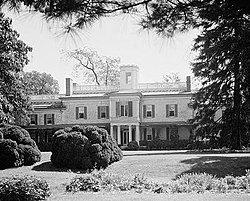Doughoregan
|
Doughoregan Manor
|
|

Doughoregan Manor, 1936
|
|
| Location | Manor Lane, Ellicott City, Maryland |
|---|---|
| Coordinates | 39°16′36″N 76°53′35″W / 39.27667°N 76.89306°WCoordinates: 39°16′36″N 76°53′35″W / 39.27667°N 76.89306°W |
| Area | 900 acres (360 ha) (landmarked area) |
| Built | est. 1727 |
| Architect | Unknown |
| Architectural style | Greek Revival |
| NRHP reference # | 71000376 |
| Significant dates | |
| Added to NRHP | November 11, 1971 |
| Designated NHL | November 11, 1971 |
Doughoregan Manor is a plantation house and estate located on Manor Lane west of Ellicott City, Maryland, United States. Established in the early 18th century as the seat of Maryland's prominent Carroll family, it was home to Charles Carroll, a signer of the United States Declaration of Independence, during the late 18th century. A portion of the estate, including the main house, was designated a National Historic Landmark on November 11, 1971. It remains in the Carroll family, and is not open to the public.
Doughoregan Manor is a colonial manor house built in the early 18th century. The slave plantation was founded on 7,000 acres patented to Charles Carroll I as "Doughoreagan" (sometimes spelled Doororegan) named for a family estate in Ireland, in 1702, and expanded to 10,000 acres as "Doughoreagan Manor" in 1717. The Georgian brick plantation house, built by Charles Carroll II around 1727, was enlarged and remodeled in 1832 by Charles Carroll V in the Greek Revival style.
From 1766 to 1832, Doughoregan Manor was the country home of Charles Carroll of Carrollton, (Charles Carroll III) last surviving signer of the Declaration of Independence. He lies buried in the chapel attached to the north end of the mansion. Notable guests that have visited the manor include George Washington, Thomas Jefferson, John Adams, John Hancock, Benjamin Franklin, James Monroe, and Marquis de Lafayette. In 1861, the manor became the home of John Lee Carroll, who became Governor of Maryland.
...
Wikipedia


